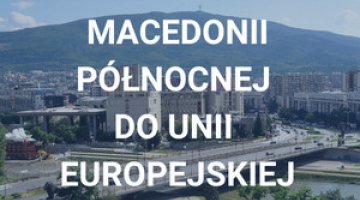Macedonia: A crisis of the idea of a multi-ethnic state
Over the past few weeks Macedonia has seen an escalation of tension between ethnic Macedonians and the Albanian minority (this minority makes up approximately 25% of the population). The ethnically motivated massive acts of violence and incidents which resulted in dozens of people being injured, were triggered by the killing of two Albanians by policeman who was ethnic Macedonian.The circumstances of this incident were not cleared up, which sparked protests among the Albanian minority, including manifestation with over 10,000 people in Gostivar. This turned into anti-Macedonian riots, the largest seen over the past decade.
The escalation of the ethnic conflict overlaps the ongoing regression of democratic transformation in Macedonia. Greece’s blocking of Macedonia’s accession to the EU and NATO in 2008 due to the conflict over the name of this state has led to a slowing down of the reform process and an entrenchment of the autocratic ambitions of Prime Minister Nikola Gruevski. The freedom of speech and the independence of the judiciary have been restricted significantly. In response to these problems, Stefan Füle, the European commissioner for enlargement, is to initiate a high-level accession dialogue on 15 March in Skopje. This dialogue will concern reforms in the five most problematic areas (including the public administration, the rule of law, and the economy).
Commentary
- The high level of public dissatisfaction in Macedonia is an effect of the bad economic situation, including high unemployment rates (42%) continuing for years, which in particular affects young people. The public cannot see any prospect for an improvement in the economic and political situation due to the blocking of the process of integration with the Euro-Atlantic structures.
- The government is capitalising on public dissatisfaction and is trying to unite the ethnic Macedonian electorate by using nationalist slogans, which draw upon ancient and Slavonic traditions, thus giving up the intention to build a multi-ethnic society. The Albanian minority do not identify themselves with this state ideology, and for some of them the creation of a country which will unite all Albanians is a more attractive prospect. The religious and linguistic differences between the two national groups are exacerbated due to segregation at schools and the low intensity of contacts between them. The conflict is additionally worsened by the disproportion in financing the Macedonian and the Albanian communes.
- The lack of democratic mechanisms for resolving disputes between these two communities and the government’s tendency to resort to violent methods make a further increase in the tension between ethnic Macedonians and Albanians more likely. It also cannot be ruled out that political groupings are hyping these incidents up and emphasising their ethnic nature to strengthen their own position in the state. Given the level of public dissatisfaction, this can be very dangerous, because local incidents may develop into broader-scale clashes. This would pose the risk of destabilisation not only in Macedonia itself but also in the neighbouring countries, where Albanians also live (Kosovo and Montenegro).
- The actions taken by the EU are intended to confirm the existence of a membership respective for Macedonia, to slow down the process of erosion of democratic mechanisms and to encourage the elite to continue the reform process. However, the initiation of dialogue will not resolve the key problem, namely the Greek blockade of the process of Macedonia’s integration with the EU. The dialogue process alone can be an insufficient motivator for the Macedonian government to re-enter the process of democratic transformation.



